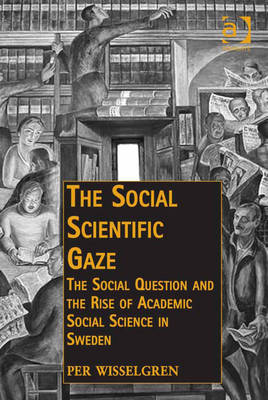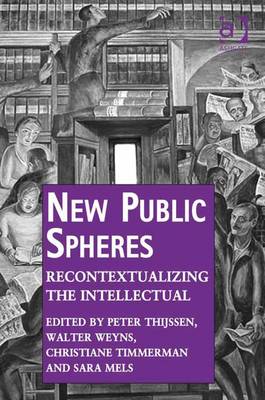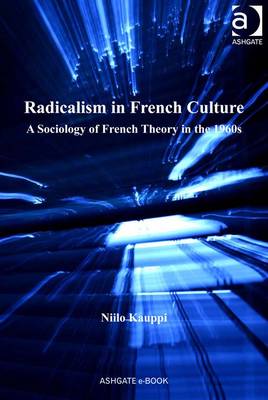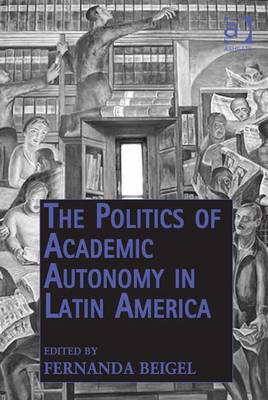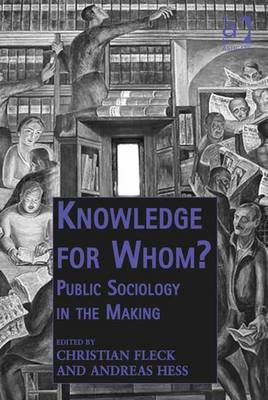Public Intellectuals and the Sociology of Knowledge
6 total works
The social sciences have, ever since they were first established as academic disciplines, played a foundational role in most spheres of modern society - in policy-making, education, the media and public debate - and hence also, indirectly, for our self-understanding as social beings.
The Social Scientific Gaze examines the discursive formation of academic social science in the historical context of the 'social question', that is, the protracted and wide-ranging discussions on the social problems of modernity that were being debated with increased intensity during the nineteenth century. Empirically, the study focuses on the Lorén Foundation, a combined private funding agency and early research institute, which was set up in 1885 to promote the rise of Swedish social science and to investigate the social question. Comprising an heuristic case, the close analysis of the Foundation makes it possible not only to reconstruct its basic ideas and practices, but also to situate its activities in broader historical and sociological context.
The Social Scientific Gaze argues that the rise of Swedish social science may be seen not only as an 'answer' to the social 'question', but also as one attempt alongside others - including contemporary social literature, the philantropic reform movement, and the introduction of modern social policy - to conceptualize, mobilize and regulate the social sphere. In this process it is furthermore shown how an ambigious yet distinct 'social scientific gaze' was discursively articulated.
New Public Spheres
The public sphere provides a domain of social life in which public opinion is expressed by means of rational discourse and debate. Habermas linked its historical development to the coffee houses and journals in England, Parisian salons and German reading clubs. He described it as a bourgeois public sphere, where private people come together and where they turn from a politically disempowered bourgeoisie into an effective political agent - the public intellectual.
With communication networks being diversified and expanded over time, the worldwide web has put pressure on traditional public spheres. These new informal and horizontal networks shaped by the internet create new contexts in which an anonymous and dispersed public may gather in political e-communities to reflect critically on societal issues. These de-centered modes of communication and influence-seeking change the role of the (traditional) public intellectual and - at first sight - seem to make their contributions less influential.
What processes, therefore, influence changes within public spheres and how can intellectuals assert authority within them? Should we speak of different types of intellectuals, according to the different modes of public intellectual engagement?
This ground-breaking volume gives a multi-disciplinary account of the way in which public intellectuals have constructed their role and position in the public sphere in the past, and how they try to voice public concerns and achieve authority again within those fragmented public spheres today.
In this ground-breaking book, Shaun Best analyses the intellectual knowledge production of Zygmunt Bauman and his rise to academic stardom in the English speaking world by evaluating the relation between his biography, the contexts in which he found himself, and why his intellectual creativity is admired by so many people. Bauman has an interesting 'contested' biography and underwent a number of intellectual shifts from the early stages of his academic career as Marxist. Bauman moved on and for almost ten years he was associated with 'postmodernity' (from 1989-1997) but in 2000 he decided to distance himself from postmodernism and rebrand his approach to understanding the contemporary world as 'liquid modernity'.
Best shows how Bauman developed his canonised status becoming an intellectual guru in the UK and in Australia despite being largely ignored by the academic community in the United States and Central Europe. Rather than investigating Bauman's academic output as a demonstration of his 'creative genius', Best argues that most academic output involves the interplay of multiple factors and this book evaluates the influences on both intellectual choices and the social factors or contexts that led Bauman to attach himself to different sets of ideas during his academic career.
An invisible pattern draws together most studies dealing with French cultural radicalism in the 1960s with intellectual creation reduced to individual creation and the role of semiotic and social factors that influence intellectual innovation minimized. Sociological approaches often see a more or less external link between social location and intellectual production but, because of their structural approach, they are incapable of taking into account unique historical circumstances, the crucial role of personal impulses, and more importantly the semiotic logic of ideas as conditions of innovative thinking.
This ground-breaking book will further an internal sociological analysis of ideas and styles of thought. It will show that the defining but largely neglected feature of what has become "French theory" was a collective mind and style of thought, an explosive but fragile mixture of scientific and political radicalism that rather quickly watered down to academic orthodoxy. For some time, radical intellectuals succeeded in producing ideas that were perfectly in tune with the demands of the consumers, mostly the young university audience. Ideas were used as part of radical posture that was set in opposition to the establishment and "those in power". Ideas could not be too empirical or verifiable, and they had to shock. It is not surprising that a slew of new sciences and concepts were invented to indicate this radical posture.
The central argument of this study is that ideas become "power-ideas" only if they succeed in uniting individual and collective psychic investment in powerful social networks with significant institutional and political backing. These conditions were met in the French context for a certain specific period of time. From roughly the mid-1960s to the beginning of the 1970s, radical intellectuals such as Roland Barthes, Pierre Bourdieu, Jacques Derrida, Michel Foucault, Julia Kristeva developed a host of new ideas, concepts and theories, a number of which have subsequently been labelled as French theory.
The Politics of Academic Autonomy in Latin America
Academic autonomy has been a dominant issue among Latin American social studies, given that the production of knowledge in the region has been mostly suspected for its lack of originality and the replication of Euro-American models. Politicization within the higher education system and recurrent military interventions in universities have been considered the main structural causes for this heteronomy and, thus, the main obstacles for 'scientific' achievements. This groundbreaking book analyses the struggle for academic autonomy taking into account the relevant differences between the itinerary of social and natural sciences, the connection of institutionalization and prestige-building, professionalization and engagement.
From the perspective of the periphery, academic dependence is not merely a vertical bond that ties active producers and passive reproducers. Even though knowledge produced in peripheral communities has low rates of circulation within the international academic system, this doesn't imply that their production is - or always has been - the result of a massive import of foreign concepts and resources. This book intends to show that the main differences between mainstream academies and peripheral circuits are not precisely in the lack of indigenous thinking, but in the historical structure of academic autonomy, which changes according to a set of factors -mainly the role of the state in the higher education system. This historical structure explains the particular features of the process of professionalization in Latin American scientific fields.
Knowledge for Whom?
This ground-breaking volume is a follow-up to Intellectuals and Their Publics. In contrast to the earlier book, which was mainly concerned with the activity of intellectuals and how it relates to the public, this volume analyses what happens when sociology and sociologists engage with or serve various publics. More specifically, this problem will be studied from the following three angles:
How does one become a public sociologist and prominent intellectual in the first place? (Part I)
How complex and complicated are the stories of institutions and professional associations when they take on a public role or tackle a major social or political problem? (Part II)
How can one investigate the relationship between individual sociologists and intellectuals and their various publics? (Part III)
This book will be of interest to academics and students working in the fields of the sociology of knowledge and ideas, the history of social sciences, intellectual history, cultural sociology, and cultural studies.
